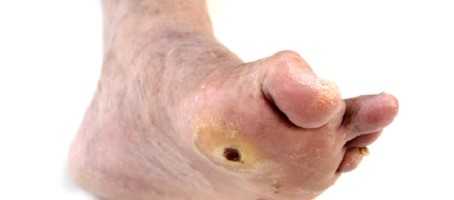Researchers in England are to clinically trial new technology that could improve treatment of severe foot ulcers in patients with diabetes.
Foot ulcers are a relatively common complication of diabetes. Higher than normal blood sugar levels can lead to a marked loss of feeling in the feet as a result of reduced nerve function, as well as poor blood circulation. In severe cases, ulcers that become infected can cause the affected tissue to die (gangrene), increasing the risk of amputation .
Quick and effective treatment is vital to stop the spread of infection and subsequent risk of gangrene and amputation. But instead of the traditional method of using a scalpel blade to surgically remove dead or infected tissue from unhealed wounds, preclinical trials suggest that novel technology known as the WoundWand Debridement Device may be more effective.
An international study is now underway to evaluate the effectiveness of using a WoundWand compared with a scalpel blade in healing infected wounds. Patients taking part in the research will be followed up over 12 weeks to assess the difference in bacterial count, reduction in wound size and improved recovery time.
The first patient for the clinical study has been recruited by Researchers at the Manchester Royal Infirmary’s Diabetes Centre and Vascular Surgery Department, together with microbiologists from The University of Manchester. A total of 60 patients will be recruited for the study, which will run across three European centres, including the one in Manchester, over the course of 1-2 years.
The WoundWand Debridement Device is designed to reduce the risk of recurring infection by using radiofrequency energy to dissolve dead tissue from infected wounds, while leaving as much healthy tissue intact as possible.
This study will mark the first time it has been used for the treatment of diabetic foot ulcers, and it is hoped that the results will lead to changes in clinical care that drastically improve quality of life for people with diabetes.
What's new on the forum? ⭐️
Get our free newsletters
Stay up to date with the latest news, research and breakthroughs.






